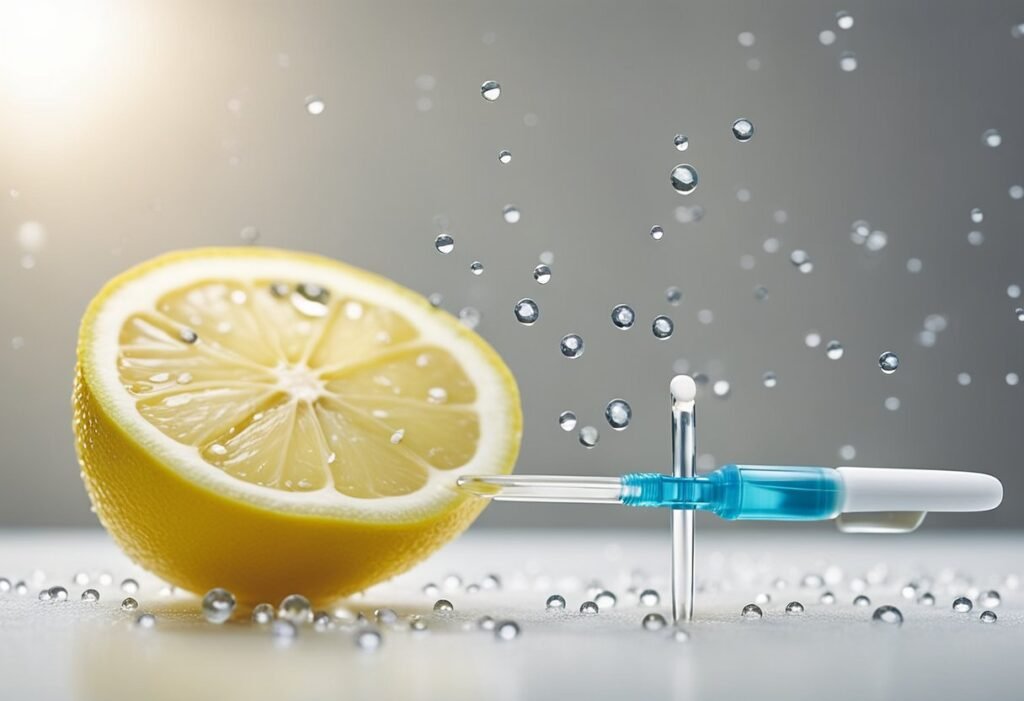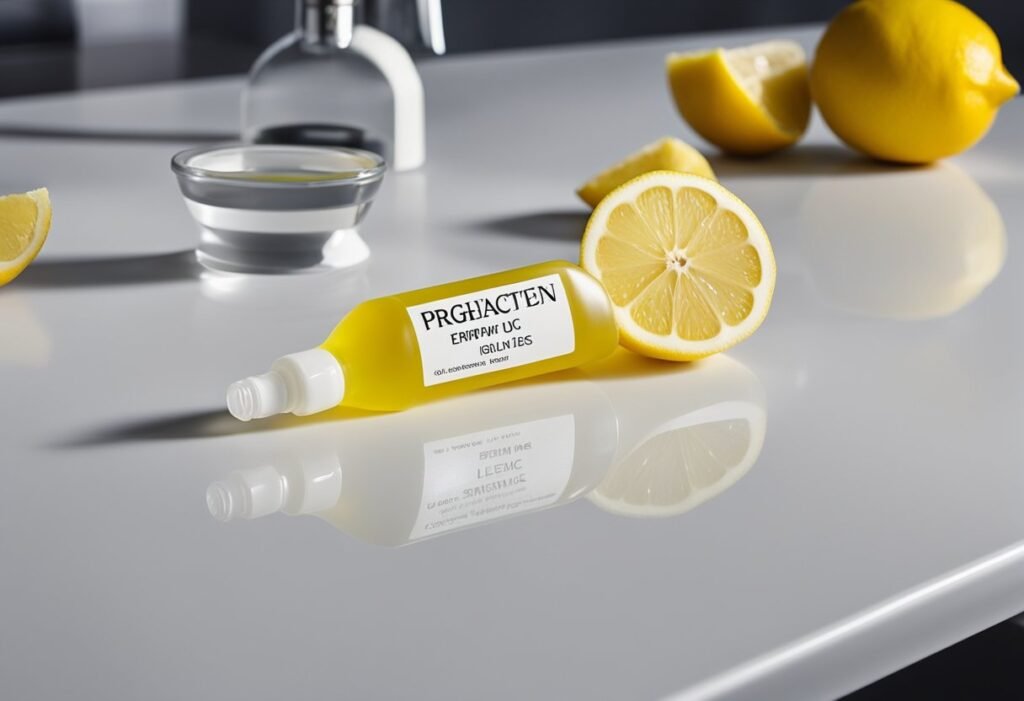Lemon juice and its acidity have been the centre of many myths, including the idea that it can affect the results of a pregnancy test.
Do you also have the same myth that ” Will lemon juice make a pregnancy test positive?”
This concept stems from the belief that the acidic nature of lemon juice can somehow alter the chemical reactions within the test, leading to false positives or negatives.

Table of Contents
A pregnancy test works by detecting the presence of human chorionic gonadotropin (hCG), a hormone produced by the body during pregnancy. The accuracy of these tests is crucial, as it can greatly affect the decisions and actions of those taking them. It is important to explore whether there is any scientific evidence supporting this claim about lemon juice and its effect on pregnancy tests.
Key Takeaways
- Lemon juice is thought to influence pregnancy test results due to its acidity.
- Pregnancy tests detect the presence of the hormone hCG.
- It is essential to determine if there is scientific support for this lemon juice myth.
Understanding Pregnancy and Pregnancy Tests

As someone who aims to provide accurate information, I’d like to provide a comprehensive understanding of pregnancy tests, their accuracy, and the factors affecting their results.
Mechanism of Pregnancy Tests
Pregnancy tests work by detecting the presence of the hormone human chorionic gonadotropin (hCG) in a woman’s urine or blood. hCG is only produced during pregnancy, so its presence is an indicator that a woman is pregnant. The levels of hCG increase rapidly in the early stages of pregnancy, making it a reliable marker for pregnancy tests.
Accuracy and Factors Affecting Pregnancy Tests
Pregnancy tests are known for their high accuracy, with most at-home tests having an accuracy rate of up to 99%. However, some factors can affect the accuracy of pregnancy tests:
- User error: Not following the instructions correctly, such as not using the test during the first-morning urine or not waiting long enough for the results, can lead to inaccurate results.
- Medications and medical conditions: Some medications, such as those used in fertility treatments, can interfere with the test results. Health conditions, such as polycystic ovary syndrome (PCOS), can also cause misleading results.
- Expiration date: Using an expired pregnancy test may provide false results.
Types of Pregnancy Tests and Their Uses
Pregnancy tests can primarily be classified into two categories:
- Home pregnancy tests (urine tests): These are over-the-counter tests that women can use in the privacy of their homes. They are designed to detect hCG levels in the urine, showing the result through coloured lines or digital displays.
- Blood pregnancy tests: These tests are conducted at a healthcare provider’s office and can detect hCG levels in the blood. Blood tests are more sensitive than urine tests, making them useful in detecting early pregnancies.
It is crucial to choose a test that best suits your needs and consult a healthcare provider if you have any doubts.
Healthcare Guidance and Medical Advice
Although pregnancy tests are widely available and known for their accuracy, it is always recommended to consult a healthcare provider for confirmation and further guidance. Early prenatal care plays an essential role in ensuring a healthy pregnancy. Your healthcare provider can advise you on lifestyle changes, prenatal vitamins, and regular check-ups to monitor your pregnancy’s progress.
Always remember, pregnancy tests are just the first step in confirming a pregnancy. It is essential to rely on medical advice and care to ensure a healthy pregnancy journey.
Lemon Juice and Its Properties

Properties of Lemon Juice
Lemon juice is known for its acidity, primarily due to its citric acid content. This property of lemon juice gives it a low pH level, making it a common ingredient in beverages like lemonade. Additionally, the acidic nature of lemon juice may contribute to common pregnancy symptoms such as heartburn.
Nutritional Impact of Lemon on Pregnant Women
Lemons are not only a refreshing flavour and scent but also a powerhouse of essential nutrients. For pregnant women, the nutritional benefits of consuming lemons (in moderate amounts) can be significant. Some key nutrients found in lemons include:
- Hydration: The juice from lemons has a high water content, helping to keep you hydrated.
- Vitamins: Lemons are rich in vitamin C, which supports the immune system and aids in tissue repair.
- Folate: This essential nutrient is crucial for pregnant women, as it helps prevent neural tube defects in the fetus.
Common Myths Surrounding Lemon Juice and Pregnancy Tests (Will lemon juice make a pregnancy test positive?)
There’s a myth circulating that the acidity in lemon juice can alter the results of a pregnancy test, leading to false positives or negatives. I have found no valid scientific evidence supporting this claim. Most research suggests that lemon juice has no impact on pregnancy test results.
I believe it’s essential to address these common myths and misconceptions, as they can cause confusion and unnecessary stress during an already emotionally charged time, like pregnancy. To ensure accurate results on a pregnancy test, follow the instructions provided by the manufacturer, and consult a healthcare professional if you have concerns or questions.
While it’s a myth that lemon juice impacts pregnancy tests, it’s important to remember the nutritional and potential benefits for pregnant women outside of this context. The key is moderation and ensuring a balanced diet to support a healthy pregnancy. As always, consult with a healthcare professional before making drastic changes to your diet or routine during pregnancy.
Influences on Pregnancy Test Results

Interference by Foods and Beverages
It’s important to know that certain foods, beverages, and substances can interfere with pregnancy test results. While some might believe that lemon juice can alter results, the truth is that lemon juice does not affect pregnancy test outcomes. However, excessive liquid consumption, particularly water, can lead to more diluted urine, which may make it harder for tests to detect the hormone hCG. This could potentially result in a false negative result.
Caffeine, alcohol, and sodas are not known to directly impact pregnancy test results. However, some medications and substances, such as THC, can cause false positives in rare cases.
External Factors Affecting Test Outcomes
Another factor that could influence pregnancy test outcomes is your immune system. Certain immune system disorders or the presence of antibodies in your system can interfere with the test’s ability to accurately detect hCG, potentially leading to false positive or false negative results.
Moreover, using expired tests may also yield inaccurate results. As tests age, their ability to accurately detect hCG can diminish, increasing the likelihood of an incorrect result. It’s always best to check the expiration date on the packaging before using a test.
Test Procedure and User Considerations
Lastly, how you perform the pregnancy test can have an impact on its accuracy. User error and timing of the test play crucial roles in ensuring accurate results. Be sure to:
- Carefully read and follow all test instructions
- Use a clean and undamaged absorbent pad
- Take the test with the most concentrated urine available, typically the first-morning urine
- Allow sufficient time for results to display
Conclusion
By being mindful of external factors, proper test procedures, and potential interferences, you can help ensure accurate pregnancy test results. Do not trust myths always consult a healthcare professional.
Frequently Asked Questions
What substances can cause a false positive on a pregnancy test?
Several medications and substances might cause a false positive on a pregnancy test. These include certain medications for infertility, seizures, and sleep disorders, as well as some antidepressants and anti-anxiety medications. It is essential to read the pregnancy test instructions carefully and consult with a healthcare professional if you suspect any medications might interfere with your test results.
How might different liquids affect the results of a pregnancy test?
Different liquids, such as water or other beverages, can dilute the urine, affecting the concentration of the pregnancy hormone hCG that the test measures. This can lead to a false negative result. It’s important to follow the instructions on the pregnancy test, which typically recommend using the first urine of the day to ensure the most accurate results.
Can household products lead to incorrect pregnancy test outcomes?
It is a myth that household products, such as lemon juice, can alter pregnancy test results. Lemon juice does not make a pregnancy test positive because the test detects hCG levels, a hormone that is not affected by such substances. Instead, it is important to follow the test instructions and avoid contaminating the test with foreign substances.
Are there any foods or drinks that can interfere with the accuracy of a pregnancy test?
Food and drinks, including alcohol, generally do not interfere with the accuracy of a pregnancy test. However, it is advised to be cautious with excessive liquid intake, as it can dilute the urine, potentially leading to a false negative result. Consuming moderate amounts of food and drinks should not affect the test outcome.
What are the common causes for a positive result on a pregnancy test aside from pregnancy?
Aside from pregnancy, certain medical conditions and medications can cause a false positive pregnancy test. These include some cancer treatments, medications for epilepsy, and certain fertility treatments. Additionally, a chemical pregnancy or an ectopic pregnancy can also be responsible for positive results. If you receive a positive test result but are uncertain about its accuracy, consult a healthcare professional for further testing and guidance.



